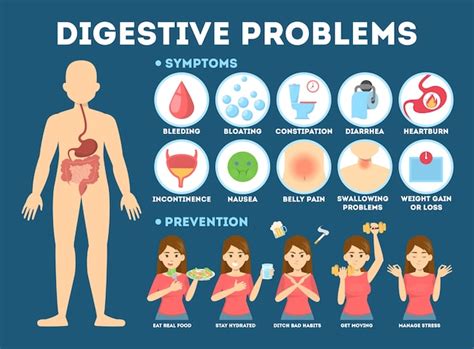Understanding Digestive Disorders: Symptoms and Treatments
Digestive Disorders FAQ
What is digestive system disease?
Digestive system disease, any of the diseases that affect the human digestive tract. Such disorders may affect the esophagus, stomach, small intestine, large intestine (colon), pancreas, liver, or biliary tract. A prevalent disorder of the digestive system is gastroesophageal reflux disease (i.e.,
What is a gastrointestinal disease?
A gastrointestinal disease is one that affects the gastrointestinal (GI) tract, the passage that runs from the mouth to the anus. Common GI disorders include irritable bowel syndrome (IBS), acid reflux, indigestion, colon cancer, and hemorrhoids. As many as 11% of Americans have gastrointestinal (GI) diseases.
Is a digestive disease serious?
A digestive disease disrupts digestion in one way or another, causing health problems that range from mild to serious. This may include something as common as acid reflux to celiac disease or cancer. This article discusses common diseases of the GI tract and when they might be considered serious.
What are some common diseases of the digestive system?
Other common diseases of the digestive system include peptic ulcers, colorectal cancer, and gallstones. Many disorders of the digestive system can be prevented by a diet low in fats and high in fruits and vegetables, limited alcohol consumption, and periodic medical examinations.
What are digestive disorders?
Digestive disorders are a group of conditions that occur when the digestive system does not function as it should. Health experts split them into two categories: organic and functional GI disorders. Organic GI disorders occur when there are structural abnormalities in the digestive system, which prevents it from working properly.
What are some common digestive problems?
Digestion problems can be uncomfortable and can disrupt your daily activities. Learn about common digestion problems such as food intolerances, Crohn's disease, GERD, chronic constipation, and IBD. Also learn about the less common causes of digestion problems such as cancer and hepatitis.
Can a disease of the digestive tract cause temporary symptoms?
Diseases of the digestive tract can cause temporary or chronic symptoms. Learn which ones are most common and warning signs of an undiagnosed condition.
Digestive Disorders References
If you want to know more about Digestive Disorders, consider exploring links below:
What Is Digestive Disorders
- https://www.medicalnewstoday.com/articles/list-of-digestive-disorders
- https://my.clevelandclinic.org/health/articles/7040-gastrointestinal-diseases
- https://www.verywellhealth.com/digestive-system-diseases-7375274
Digestive Disorders Information
Explore Related Topics
Antioxidant-Rich Superfoods: A New Hope for Asthma Patients?
Investigating whether incorporating antioxidant-rich superfoods into one’s diet can provide new hope for those suffering from asthma.
The Best Homeopathic Remedies for Asthma Relief: A Comprehensive Guide
Listing and discussing the most effective homeopathic remedies known for providing asthma relief.
Antioxidants in Vegan Diets: A Breath of Fresh Air for Asthmatics?
Discussing the potential of antioxidants found in vegan diets to help manage asthma symptoms.
The Truth Behind Herbal Remedies for Asthma: Do They Work?
A critical look at the efficacy and safety of using herbal remedies to treat asthma.
How Spices Can Influence Asthma Control
Engage in conversations about how certain spices may positively or negatively impact asthma. Share recipes, research, and personal spice-related experiences.
The Role of Nutrition in Exercise-Induced Asthma
Examining how diet and nutrition play a role in managing exercise-induced asthma. Discuss anti-inflammatory foods and supplements that may help.
Are Natural Supplements Effective in Asthma Management?
Exploring the role of natural supplements in managing asthma and how they compare with pharmaceutical treatments.
Can Diet Make a Difference in Managing Exercise-Induced Asthma in Children?
Discuss the role of diet in managing exercise-induced asthma in children, exploring nutritional strategies.
Understanding the Principles of Homeopathy in Treating Asthma
A deep dive into how the core principles of homeopathy apply to asthma treatment and management.
Herbal Remedies for Asthma: Do They Work?
Investigating various herbal remedies traditionally used for asthma and their effectiveness. Share knowledge, research findings, and personal anecdotes about herbal treatments.
Can Certain Diets Improve Exercise-Induced Asthma?
Discussing the impact of specific diets on exercise-induced asthma and how to manage symptoms through nutrition.
